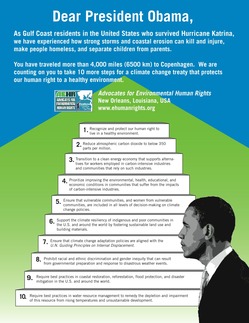Gulf Coast grabs attention at U.N. climate conference
 An environmental advocacy group is running a full-page ad [pdf] in a Copenhagen newspaper during the closing days of the United Nations Climate Change Conference to draw attention to the special needs and vulnerabilities of the U.S. Gulf Coast.
An environmental advocacy group is running a full-page ad [pdf] in a Copenhagen newspaper during the closing days of the United Nations Climate Change Conference to draw attention to the special needs and vulnerabilities of the U.S. Gulf Coast.Advocates for Environmental Human Rights, a New Orleans-based nonprofit, sponsored the ad, which points to the trauma of Hurricane Katrina and offers 10 steps President Obama can take to protect the Gulf region and other communities vulnerable to the effects of climate change. The recommendations were developed by a coalition of advocacy groups based in the Gulf.
"We want to bring attention to the human suffering already taking place from disastrous weather events in the Gulf Region of the United States," said Nathalie Walker, an attorney and AEHR's co-director. "The Gulf Region needs a strong climate change treaty that can move our government, which has done a poor job regarding coastal erosion, flood protection and disaster response, as well as pollution from carbon-intensive industries."
The ad is running in the COP 15 Post, a special daily newspaper published during the conference by The Copenhagen Post, the only English language newspaper in the Danish city. Obama is scheduled to arrive at the conference on the closing day, set for Friday, Dec. 18.
While scientists have not blamed global warming directly for Hurricane Katrina, which devastated the Gulf Coast in 2005, they have pointed to a connection between climatic warming and increased storm strength. This is a special concern for the Gulf region, which is particularly prone to hurricanes.
The Gulf Coast is also highly vulnerable to sea-level rise. Earlier this year, for example, members of the Biloxi-Chitimacha Indian tribe announced plans to leave behind their ancestral homeland on Louisiana's Isle de Jean Charles due to intensified flooding associated with global warming.
"If we compel our leaders to do what it takes to protect our human right to live in a healthy environment, we can mitigate greenhouse gas emissions and adapt to climate change," said AEHR Policy Director Michele Roberts, who is in Copenhagen for the treaty negotiation session.
Other Gulf Coast advocates attending the climate change conference include Sharon Hanshaw of Coastal Women for Change in Biloxi, Miss.; Brenda Dardar Robichaux of the United Houma Nation in Louisiana; and Beverly Wright of the Deep South Center for Environmental Justice, which is based at Dillard University in New Orleans.
Tags
Sue Sturgis
Sue is the former editorial director of Facing South and the Institute for Southern Studies.
